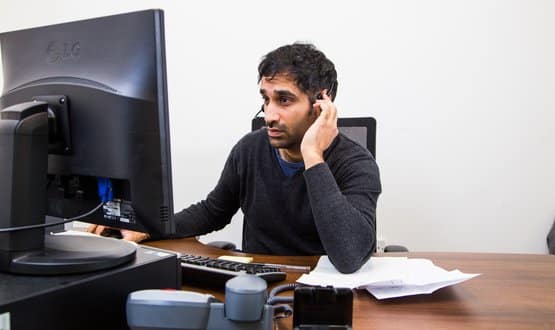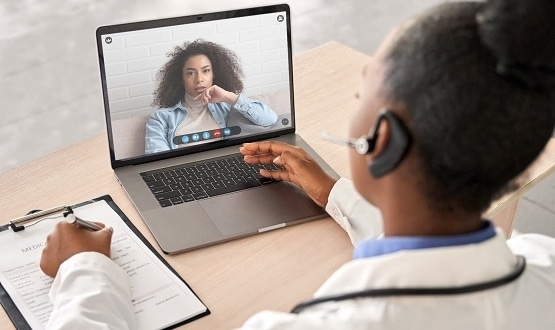Birmingham digital GP centre rated ‘Outstanding’ by the CQC

A digital GP centre in Birmingham has been rated ‘Outstanding’ by the Care Quality Commission (CQC).
South Doc Services Limited runs virtual primary care services for the MyHealthcare GP federation, which are run at several hubs across Birmingham and involve more than 47 GP practices, covering around 300,000 registered patients.
Each practice has full access to the Virtual Centre, based at West Heath Medical Centre, which was inspected by the CQC in April 2018.
The virtual centre was launched in 2015 and is part of a pilot project initially funded by by the Prime Minister’s Challenge Fund – a £50 million Challenge Fund to help improve access to general practice and stimulate innovative ways of providing primary care services.
The digital service allows patients to book telephone and video consultations with a GP, nurse practitioner or prescribing pharmacist seven days a week.
Other virtual services include an app for patients and a telephone-based prescription ordering department (POD).
A report, published by the CQC on 11 July, rated the service ‘Outstanding’, commending the fact the “service used technology to improve treatment and to support patients’ independence”.
The CQC also praised the provider’s MyHealthcare Patient App, which offers long-term condition management and lifestyle management.
According to the report, the app is linked to patients’ records and, at the time of publication, there were approximately 3000 people registered.
The inspectorate also mentioned how unverified data from the provider showed that the virtual service had “reduced the burden on other services such as hospital emergency departments”.
Nirmal Vora, CEO at SDS MyHealthcare, said he was “delighted” with the rating.
He added: “As an innovative partner, we’re keen to bring the NHS’s online offering into the modern era. Patients already enjoy outstanding digital experiences in the retail and entertainment sectors, for example, and we’re determined to add public healthcare to that list.
“As an NHS initiative, we are ideally placed to have full access to all its many services. This gives us a unique advantage over the private sector. But to be truly successful, it’s vital that our technology outperforms that of our commercial rivals. This is why we’re working hard to improve our video consultations and app capabilities even further.”
Speaking to Digital Health News, Vora said that the aim of the virtual centre was “not to disrupt the market” but rather provide a “continuity of care” for patients and give them faster access to their GP.
He added: “This has not been done for private reasons.”
The CQC published a separate report in March 2018 that looked into services that provide GP consultations and prescriptions, through independent websites and apps.
The report revealed that 43% of the providers inspected by the CQC were found not to be providing safe care in accordance to the relevant regulations.
However, this was an improvement from 86% not fully meeting these regulations on their first inspections.





4 Comments
This Federation facilitated by Birmingham CCG has a reputation for corruption – members of the Birmingham Cross City CCG board have vested interests in the out of hours contract awarded by the CCG, The PM Challenge Fund was won by the federation, and the suppliers never chosen correctly – simply a ‘company’ was created by one of the relatives of the GP in the federation – to make matter worse they received more money earlier this year through the Technology and Infrastructure fund, with a justification that it should go to them as they won the initial PMCF bids. No study has been done for value for money ( as its not) as its been a money pot for Mr ‘Nirmal Vora, CEO at SDS MyHealthcare, – no wonder he says ‘he was “delighted”’
So the App is used by 1% of the practice populations – pretty small beginnings. How will it grow to make a significant contribution? And at what cost – has it demonstrated value for money?
With any IT project especially in healthcare, a system wide analysis is required to reflect true cost/ROI – has this been done to create a robust evidence base before wider adoption is supported?
I’m not denying the local politics and the particular issues around PMCF. However, there is no health app regulation, other than the medical device regulations and Data Protection and Information Governance. The NHS Digital apps library is a voluntary programme and there are a number of hoops to go through to be approved to be in the library. That is very different to regulation.
Anyone who knows the politics of Birmingham will understand how this came about. We don’t want to stifle innovation but the CEO of this organisation is also related to one of the GP’s in the federation that won the initial Prime ministers challenge fund. This stifled any competition for any external providers for innovation as the money went to the ‘closed circle’ and preferential provider which was unfair. The app has not passed the NHS Digital App process, which continues to make a mockery of central NHS Digital efforts to regulate apps. So in summary well done – but its down to unfair competition, blatent use of public money by a private organisation, facilaited by vested interests of GP’s, collusion by individuals from corrupt birmingham CCG’s and lack of adherence to centralised app regulation and accountability.
Comments are closed.